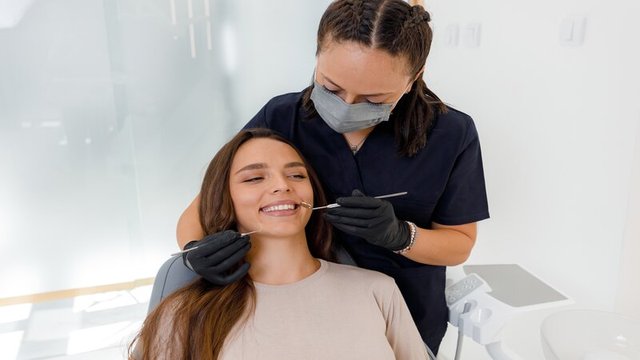
What does a dental hygienist do?
June 25, 2025

If you’re considering a degree in dentistry in Madrid or elsewhere, you may be wondering, what does a dental hygienist do?
While dentists often take centre stage, dental hygienists play an equally vital role in maintaining oral health and preventing disease.
In this blog post, we’ll explore the dental hygienist role, the responsibilities involved, the skills required, and how to pursue this fulfilling career—especially at Universidad Europea, which offers excellent study options across Spain.
What is a dental hygienist?
Before diving into their responsibilities, let’s define what a dental hygienist actually is. A dental hygienist is a licensed oral health professional who focuses on preventing and treating oral diseases. They work alongside dentists to provide patients with preventative dental care, advice on oral hygiene, and early detection of dental issues.
Dental hygienists are often the first point of contact for patients during routine dental check-ups. Their work helps reduce the need for more complex treatments and supports the overall effectiveness of dental care services.
The role and responsibilities of a dental hygienist
So, what does a dental hygienist do in practice? Their day-to-day tasks go far beyond cleaning teeth. The dental hygienist role includes:
- Conducting oral health assessments to identify signs of gum disease, tooth decay, or other conditions.
- Performing professional cleanings, including scaling and polishing to remove plaque and tartar.
- Applying preventive materials like fluoride and sealants to help strengthen enamel.
- Educating patients about proper brushing, flossing techniques, and general oral hygiene.
- Taking dental X-rays and analysing them for signs of dental problems.
- Maintaining patient records and updating dental charts.
- Supporting dentists during more complex procedures, if required.
A dental hygienist acts as both a caregiver and an educator, helping patients take control of their oral health and avoid long-term issues.
What skills do you need to be a dental hygienist?
Being a dental hygienist requires a unique blend of technical ability and interpersonal skill. Here are some of the core competencies needed:
- Attention to detail: Spotting early signs of decay or disease can prevent serious issues.
- Manual dexterity: The job involves working with small tools in tight spaces.
- Communication skills: Explaining procedures and advice in a way patients understand is crucial.
- Empathy and patience: Dental visits can be stressful for many patients, especially children or those with dental anxiety.
- Teamwork: Collaborating effectively with dentists, dental nurses, and administrative staff.
These skills make the dental hygienist role both challenging and rewarding, with strong potential for personal and professional growth.
What degree do you need for a dental hygienist?
To become a dental hygienist, you need to complete a recognised programme in dental hygiene, often available at universities and dental schools. These programmes typically include:
- Anatomy and physiology
- Oral pathology
- Radiography
- Periodontology
- Clinical practice in dental hygiene
A degree in dentistry will equip you with the theoretical knowledge and hands-on clinical experience necessary for professional registration and practice.
Why study at Universidad Europea?
If you're looking to pursue a degree in dentistry or dental hygiene, Universidad Europea offers outstanding options across Spain. As well as the dentistry degree in Madrid, you can also choose the degree in dentistry in Valencia, the degree in dentistry in Alicante or the degree in dentistry in Malaga. Here’s why Universidad Europea is a top choice:
- Modern facilities: All campuses are equipped with state-of-the-art simulation clinics and dental labs.
- International outlook: Programmes are designed with a global approach and many are taught in English.
- Clinical placements: Students benefit from early, real-world experience through partnerships with local dental clinics and hospitals.
- Flexible learning: Choose from various locations to suit your lifestyle—whether you prefer the cosmopolitan city life of Madrid or the coastal charm of Alicante or Valencia.
- Experienced faculty: Courses are taught by leading professionals and academics with extensive industry knowledge.
Studying at Universidad Europea gives you a solid foundation in the dental hygienist role, with the academic and clinical preparation needed to thrive in the field.
If you’re passionate about oral health, enjoy working with people, and are interested in a healthcare role that blends science with patient care, then dental hygiene might be your calling. Understanding what does a dental hygienist do is the first step towards a rewarding career in dentistry.
By pursuing a degree at Universidad Europea, you'll gain not only the qualifications you need but also the practical experience and confidence to succeed in this essential role.